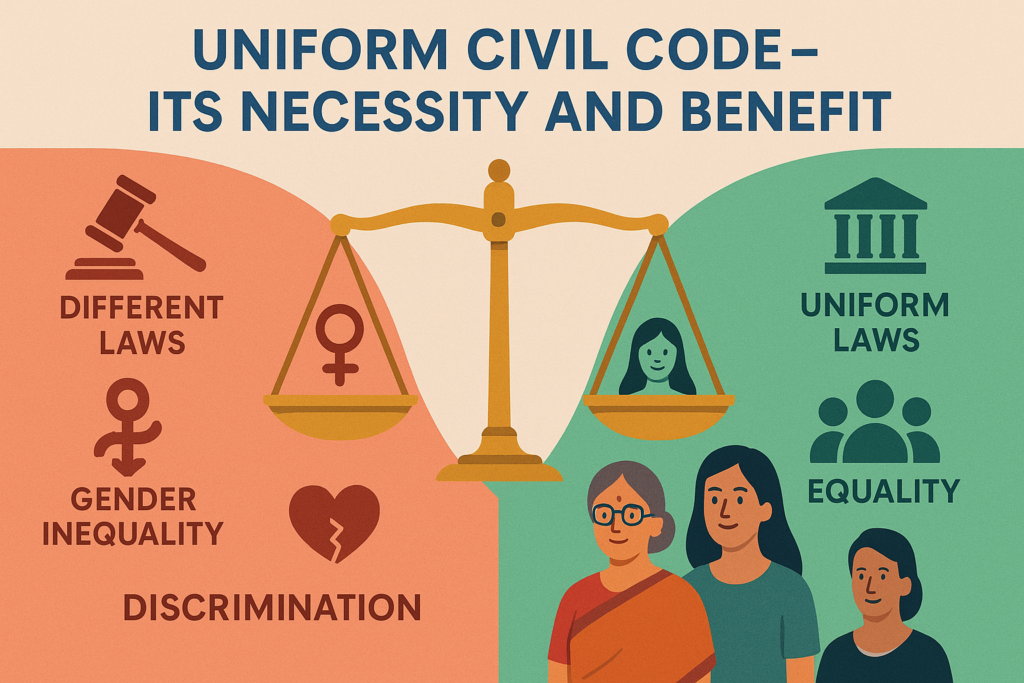Why UCC Required
Until the 1950s, untouchability was legal in India. A shocking truth, isn’t it? But it raises a more pressing question—if we could legally abolish something so deeply entrenched and unjust, why are we still hesitating to confront other discriminatory practices today?
For instance:
- Should it be legal for someone to marry under the age of 18?
- Should one man be allowed four wives, while others face prosecution for bigamy?
- Should a woman inherit less than half of what her male counterpart receives?
- Why can’t a Muslim woman claim maintenance like other Indian women?
These are not hypothetical questions. These are legal realities under India’s personal laws—laws that differ from religion to religion.
Let’s dive into what the Uniform Civil Code (UCC) is, why it matters, and why it continues to stir both support and controversy.
What Is the Uniform Civil Code (UCC)?
The UCC, enshrined under Article 44 of the Indian Constitution (Directive Principles of State Policy), aims to replace personal laws based on religious scriptures with a common set of laws governing personal matters like marriage, divorce, inheritance, and adoption for all citizens.
In India, criminal laws (IPC), contract laws, and constitutional laws are uniform—except personal laws, which are fragmented across communities. Currently, Hindus, Muslims, Christians, Parsis, and others follow their own personal codes, creating inconsistencies and inequalities, especially for women.
Historical Context of Personal Laws in India
Pre-British Era:
- Hindus followed the Shastras, interpreted by Brahmins.
- Muslims followed Sharia, interpreted by Qazis.
- Rulers executed the interpretations.
During British Rule:
The British introduced English common law for their citizens, but allowed Indians to retain their religious laws. Codified laws were introduced selectively, such as:
- Hindu Widow Remarriage Act
- Hindu Inheritance Act
- Muslim Personal Law (Shariat) Application Act
- Dissolution of Muslim Marriages Act
By 1946, India had a fragmented legal landscape—prompting the Constituent Assembly to discuss the idea of a UCC.
UCC in the Constitution: How Did It Get There?
The drafting committee debated extensively on including UCC. Initially placed under Article 35, it faced opposition from leaders like Mohammad Ismail, who argued it would infringe upon religious freedom.
Ultimately, UCC was moved to Article 44—as a Directive Principle, not a Fundamental Right. This meant it could guide governance but wasn’t enforceable by courts.
Why Do We Need UCC? Real-Life Legal Disparities
Let’s break down some contradictions:
- Bigamy Law (IPC Section 494)
- Punishable for all—except Muslim men, who are legally allowed up to four wives.
- Maintenance Rights
- Hindu, Christian, and Parsi women can claim post-divorce maintenance under CrPC Section 125.
- Muslim women were excluded from this after the Muslim Women (Protection of Rights on Divorce) Act, 1986.
- Inheritance Rights
- Hindu women enjoy equal property rights.
- Muslim women often receive less than half of a male heir’s share.
- Marriage Age
- Legal age is 18 for girls and 21 for boys, but some personal laws override this, indirectly allowing child marriages.
Important Court Cases That Shaped the Debate
🔹 State of Bombay v. Narasu Appa Mali (1952)
A Hindu man was convicted for bigamy. He argued second marriage was religiously justified due to the need for a male heir. The court upheld the law, declaring religion cannot override criminal statutes.
🔹 Shah Bano Case (1985)
A 62-year-old Muslim woman was divorced and denied maintenance. The Supreme Court ruled in her favor, but the government overruled it with a new law—showing how religion influenced justice delivery.
🔹 Shayara Bano Case (2017) – Triple Talaq
The practice of Talaq-e-biddat was declared unconstitutional. The court emphasized that personal laws cannot contradict fundamental rights like equality and dignity.
Where Are We Today? (2023 Onward)
In March 2023, a PIL sought Supreme Court intervention to implement the UCC. The Court responded: Only Parliament can legislate on it.
Meanwhile:
- PM Modi has publicly supported UCC, often cited in BJP manifestos.
- The 22nd Law Commission has invited public feedback (deadline: July 14).
- The 21st Law Commission (2018) had concluded that UCC was “neither necessary nor desirable” at the time, citing practical difficulties and diversity concerns.
Is the UCC a Hindu-Muslim Debate?
Not necessarily.
The goal of UCC is not to impose one religion’s practices on another. It’s to eliminate discriminatory laws, just as untouchability was abolished.
Legislators must prioritize justice and equality, not community appeasement. The UCC debate is about rights, not rituals.
Can UCC Be Made a Fundamental Right?
Just like the Right to Education, which started as a Directive Principle and later became a Fundamental Right, UCC could follow a similar path. As India progresses, new rights and reforms become necessary.
Pros and Cons of the Uniform Civil Code
✅ Pros:
- Promotes gender equality
- Ensures equal rights for all citizens
- Enhances national integration
- Simplifies legal processes and reduces loopholes
❌ Cons:
- Seen by some as an attack on religious freedom
- May be difficult to implement due to legal diversity
- Political resistance from certain communities and states
- Requires sensitive, well-planned execution
Conclusion: What Lies Ahead?
UCC isn’t about forcing everyone to follow the same wedding rituals or abandon religious identities. It’s about establishing a common legal foundation where rights are equal, and justice isn’t conditional.
The Constitution is supreme—and personal laws must align with it. Not the other way around.
If reforms in personal laws can achieve the same outcomes as UCC, great. But if outdated, unequal laws persist under the guise of tradition, then UCC becomes not just necessary—but urgent.
India must choose: Preserve injustice in the name of diversity, or reform laws in the name of equality.

